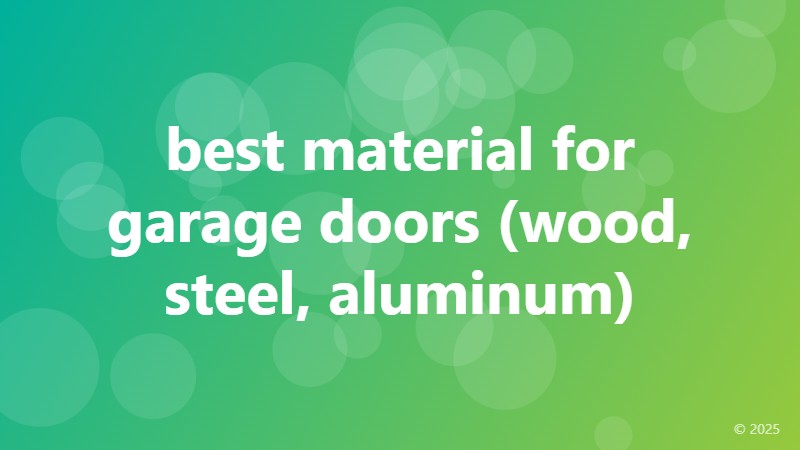best material for garage doors (wood, steel, aluminum)
 ```html
```html
Choosing the Best Material for Your Garage Door: Wood, Steel, Aluminum, and More
Selecting the right garage door material is a crucial decision impacting your home's curb appeal, security, energy efficiency, and long-term maintenance. Three popular choices dominate the market: wood, steel, and aluminum. Each boasts unique advantages and disadvantages, making the selection process a careful consideration of your individual needs and budget. This guide delves into the pros and cons of each material, helping you choose the best material for your garage door.
Steel Garage Doors: Strength, Durability, and Affordability
Steel garage doors are incredibly popular due to their robust construction and affordability. They offer excellent security, resisting forced entry better than wood or aluminum. Steel is also relatively low-maintenance, requiring only occasional cleaning and lubrication. However, steel doors can dent, and they're prone to rust if not properly coated and maintained. The thermal efficiency of steel doors can vary widely depending on the insulation level; choosing a well-insulated steel door is crucial for energy savings.
Pros: High security, durable, affordable, widely available in various styles.
Cons: Prone to denting and rust, can be noisy if not properly lubricated, thermal efficiency depends on insulation.
Wooden Garage Doors: Classic Charm and Natural Beauty
Wood garage doors exude timeless elegance and character, adding significant curb appeal to any home. They offer excellent insulation and sound dampening properties, creating a more comfortable and quieter garage environment. However, wood requires significant ongoing maintenance to prevent rotting, warping, and insect damage. It's also more susceptible to damage from harsh weather conditions. The cost of wood garage doors is typically higher than steel or aluminum options.
Pros: Excellent insulation, beautiful aesthetic appeal, customizable designs.
Cons: High maintenance, susceptible to rot, warping, and insect damage, more expensive than steel or aluminum.
Aluminum Garage Doors: Lightweight, Low-Maintenance, and Modern
Aluminum garage doors are known for their lightweight construction and low maintenance. They're resistant to rust and corrosion, making them ideal for coastal areas or regions with high humidity. Aluminum doors are also relatively easy to operate. However, they are not as strong or secure as steel doors, and they can dent more easily. Their insulation properties are typically less effective than wood or well-insulated steel doors.
Pros: Lightweight, low maintenance, rust-resistant, modern aesthetic.
Cons: Less secure than steel, can dent easily, less insulating than wood or well-insulated steel.
Beyond the Big Three: Fiberglass and Composite Garage Doors
While steel, wood, and aluminum are the most common materials, other options exist. Fiberglass garage doors offer a low-maintenance alternative that mimics the look of wood without the upkeep. Composite garage doors blend different materials to create a durable and energy-efficient option. However, these options might be less readily available and potentially more expensive than the traditional choices.
Factors to Consider When Choosing Your Garage Door Material
Before making your decision, consider these crucial factors:
- Budget: Steel is generally the most affordable, followed by aluminum, with wood being the most expensive.
- Maintenance: Steel and aluminum require minimal maintenance, while wood needs regular care.
- Climate: Wood is less suitable for extremely wet or cold climates, while aluminum is resistant to corrosion.
- Security: Steel offers the best security, while aluminum is the least secure.
- Aesthetics: Choose a material that complements your home's architectural style.
- Energy efficiency: Insulated steel doors provide good energy savings.
Conclusion: The Best Material Depends on Your Needs
There's no single "best" material for a garage door. The optimal choice depends on your priorities, budget, and climate. By carefully weighing the pros and cons of steel, wood, aluminum, and other options, you can make an informed decision that will enhance your home's value and functionality for years to come. Remember to consult with a garage door professional to discuss your specific needs and get personalized recommendations.
```